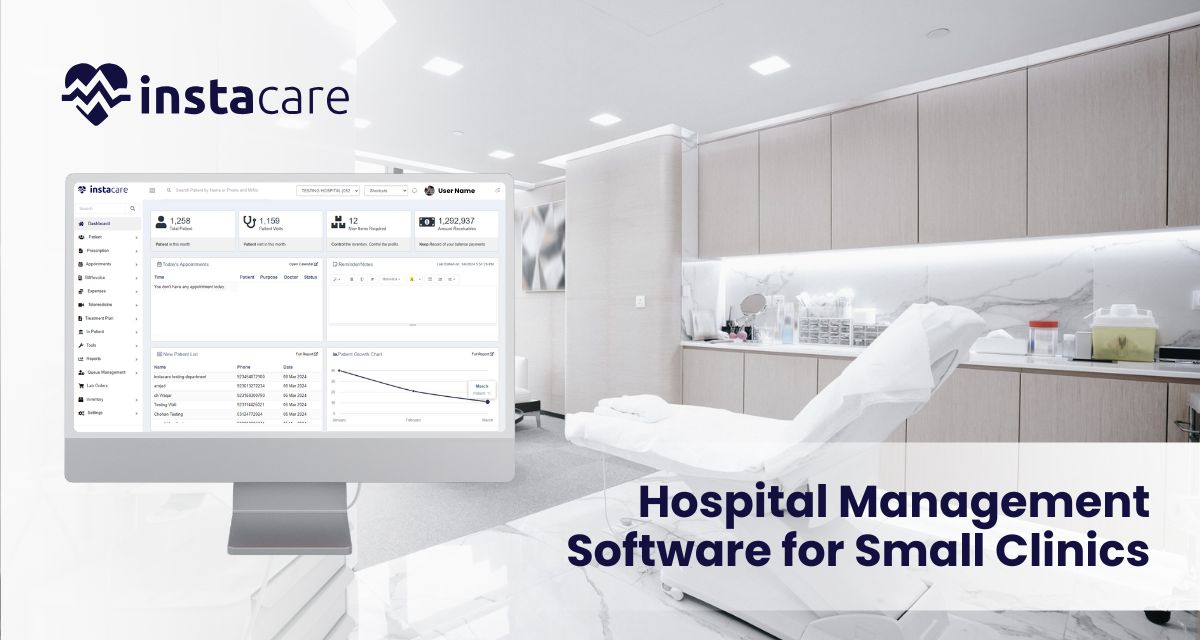Last updated on Friday, 1, November, 2024
In running a small clinic, there are challenges specific to one such as jobs in managing records of patients, billing, and scheduling for the clinic staff. With the boom in technology, one area that is increasingly being opted for in healthcare institutions such as small clinics is the Hospital Management Software (HMS). These systems would be able to automate most administrative and operational processes with promises of efficiency and accuracy as well as overall clinic performance.
However, in the smaller clinics with tight budgets and fewer resources, the question arises whether such software is worth investing. In the following article, the pros and cons are presented with this hospital management system for small clinics, as well as if it is a wise investment for smaller health care facilities.
Table of Contents
What is Hospital Management Software?
Hospital management software: This type of software is referred to as a comprehensive tool that keeps all the functions of a healthcare facility within one platform. The modules included are patient registration, management of medical records, scheduling appointments, billing and pharmacy management, and then reporting. HMS varies according to the facility’s size or type and the specific needs of the clinic.
For a small clinic, such software can provide levels of automation that streamline daily operations. As against bigger hospitals, small clinics may not necessarily need all the features of larger HMS, yet they could be willing to pay for customized or scaled-down versions of the more particular workflow and needs.
Benefits of Hospital Management Software for Small Clinics
1- Streamline Administrative Tasks
The small clinics face a problem of the administrative workload, including appointment scheduling, maintaining patient records, and handling billing. These tasks eat into time that could be utilized in efficient care of patients. HMS automates most such processes, thereby cutting down on time utilized for these aspects and giving room for more discussion on patients.
2- Enhanced Patient Care and Experience
Apart from improving the smooth working of a clinic, the management software has a direct relationship with the level of care given to the patient. The electronic medical records help doctors and nurses quickly access patients’ histories, prescriptions, and test results, thereby enabling faster diagnoses and treatment.
3- Enhanced Data Accuracy
Proper medical records, wrong billing, and other problems affecting patient care and the financial health of the clinic are prone to human error from manual data entry. In HMS, there will be lower risks of errors because data entry processes are automated. Digital data storage and retrieval imply lesser chances of lost or misplaced records.
4- Cost efficiency
Although the initial investment into purchasing and implementing hospital management software is done, long-term cost savings can be achieved. Automated administrative work can minimize clerical mistakes, which might possibly contribute to saving on costly errors. Moreover, it increases billing accuracy and better tracking of payments so that clinics prevent leakage of revenue and ensure smooth cash flow.
5- Improved Financial Management
HMS usually comes with billing and accounting modules through which a clinic can monitor real-time performance. It can automate invoicing, payment tracking, and insurance claims processing. Such levels of automation simplify financial management and minimize errors that may easily be made; hence, small clinics stand better chances of having healthy financial standing.
6- Compliance and Reporting
Patients’ records or any form of data with regard to the hospital services provided always maintain strict requirements in relation to privacy and how data management is handled, including HIPAA in the United States or GDPR in Europe. Software for the management of hospitals ensures that small clinics are in compliance with standards by securing all data about the patients, utilizing proper controls and encryption.
7- Scalability
This is an area where a bigger system for a small clinic will become more apparent. The other strong advantage of this kind of software is that it supports scalability. A small clinic may start on a more basic version of the software, but as its patient base and service offerings grow, the software can be scaled up to include additional modules, functionalities, or user licenses.
Obstacles in Implementing Hospital Management Software in Small Clinics
1- Introduction or Upfront Investment Costs
Some of the significant concerns when procuring hospital management software for a small clinic revolve around high upfront costs of acquisition and implementation. While large hospitals can source funds to spend on entire systems from vendors, a similar cost could be too strenuous for small clinics to handle. However, most vendors have accommodative payment plans, while others even provide a cloud-based subscription model that could help reduce large capital expenditures.
2- Training and Transition Stage
Staf training is a very fundamental need when implementing a new software system and may last for months that halt some of the normal operations of the clinic. Small clinics with few staffs in most instances may find it quite challenging to set time and resources for such training with a clinic still running smoothly.
3- Customization and Over-Complexity
Probably, because several management software systems for hospitals are designed for use in much larger hospitals and may come with very complex features that the small clinic does not require. Their over-complexity creates difficulty in use, and this is going to demoralize the staff unfamiliar with the technological aspect of the system. Smaller clinics can check on this by choosing a system that is specified for their size and operational needs; hence, it would be friendly to use without over-complexity.
4- Maintenance and Support During usage
After implementation, Hospital Management Software needs to be maintained continuously in order to retain its performance. This includes updating software, rectifying bugs found, and providing technical assistance. Some vendors of HMS software include services associated with these in their delivered subscriptions or licensing agreements; however, others would demand separate payment for the ongoing support. Such small clinics would thus need to factor in such possible costs while determining the total cost of owning HMS.
Is It the Worth Investment?
Considering these pros and cons, only the needs and financial capabilities of small clinic shall decide whether one should invest in hospital management software.
HMS certainly makes a world of difference to clinics that are eagerly looking forward to increasing efficiency, relief from administrative pressures, and superior patient services. Automating billing, appointment scheduling, and electronic medical record generation will save time, reduce errors, and increase pleasant experience among patients.
For clinics concerned with the possible large initial investment cost, cloud-based solutions make the investment less costly and scaled for on-premise systems. The long-term cost benefits resulting from efficient management of funds as well as operations may outweigh the costs of initial investment.
While the initial investments and the implementation barriers of training may deter some of the small clinics, the overall benefits that HMS have on the efficiency, accuracy, and patient care will make the investment worthwhile by most the small healthcare providers. In fact, advances in technology and increasing afforability as well as availability will make the same even more significantly beneficent to smaller clinics by their adoption of hospital management software.
Conclusion
Hospital management software can be a powerful tool for small clinics in many ways. The application will streamline the operations, improve patient care, and more accurate data. Even though the initial prices and problems involved in the transition process are heavy, long-term savings from an HMS often supersede the cost of such initial investments. With a focus on training the staff and rendering better patient care, small clinics will fully succeed in unlocking the possibility of hospital management software with higher service quality.
FAQ’s
Is it hard to implement hospital management software in small clinics?
Application is a bit cumbersome during the transition phase, but with proper training and phase-wise implementation, the disruption to the clinic’s operation can be kept at a bare minimum.
Can hospital management software support the small clinic to comply?
Yes, most HMS systems are designed to be complaint health care, keeping patients’ data safe and proper control access; such systems can even generate compliance reports.



